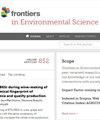利用加权深度学习模型改进强降雨预报
IF 3.3
3区 环境科学与生态学
Q2 ENVIRONMENTAL SCIENCES
引用次数: 1
摘要
天气预报在社会经济中发挥着重要作用。然而,在降水预报方面,特别是在暴雨预报方面,实际数值天气预报不够准确。以往利用深度学习(DL)方法进行NWP偏差校正的工作大多集中在局部地区,而中国范围内的降水预报校正尚未尝试。与此同时,早期的研究并没有特别关注强降雨,尽管它们具有严重的灾难性影响。在这项研究中,我们提出了一个称为加权U-Net(WU-Net)的DL模型,该模型结合了各种降水事件的样本权重,以改进对中国强降水的预测。与普通U-Net和ECMWF-IFS相比,WU-Net可以进一步提高暴雨预报能力。进一步分析表明,这种改善随着交付周期的增加而增加,并且主要分布在中国东部地区。本研究表明,考虑气象数据不平衡的DL模型可以进一步改进数值天气预报产生的降水预报。本文章由计算机程序翻译,如有差异,请以英文原文为准。
Improving the heavy rainfall forecasting using a weighted deep learning model
Weather forecasting has been playing an important role in socio-economics. However, operational numerical weather prediction (NWP) is insufficiently accurate in terms of precipitation forecasting, especially for heavy rainfalls. Previous works on NWP bias correction utilizing deep learning (DL) methods mostly focused on a local region, and the China-wide precipitation forecast correction had not been attempted. Meanwhile, earlier studies imposed no particular focus on strong rainfalls despite their severe catastrophic impacts. In this study, we propose a DL model called weighted U-Net (WU-Net) that incorporates sample weights for various precipitation events to improve the forecasts of intensive precipitation in China. It is found that WU-Net can further improve the forecasting skill of heaviest rainfall comparing with the ordinary U-Net and ECMWF-IFS. Further analysis shows that this improvement increases with growing lead time, and distributes mainly in the eastern parts of China. This study suggests that a DL model considering the imbalance of the meteorological data could further improve the precipitation forecasting generated by numerical weather prediction.
求助全文
通过发布文献求助,成功后即可免费获取论文全文。
去求助
来源期刊

Frontiers in Environmental Science
Environmental Science-General Environmental Science
CiteScore
4.50
自引率
8.70%
发文量
2276
审稿时长
12 weeks
期刊介绍:
Our natural world is experiencing a state of rapid change unprecedented in the presence of humans. The changes affect virtually all physical, chemical and biological systems on Earth. The interaction of these systems leads to tipping points, feedbacks and amplification of effects. In virtually all cases, the causes of environmental change can be traced to human activity through either direct interventions as a consequence of pollution, or through global warming from greenhouse case emissions. Well-formulated and internationally-relevant policies to mitigate the change, or adapt to the consequences, that will ensure our ability to thrive in the coming decades are badly needed. Without proper understanding of the processes involved, and deep understanding of the likely impacts of bad decisions or inaction, the security of food, water and energy is a risk. Left unchecked shortages of these basic commodities will lead to migration, global geopolitical tension and conflict. This represents the major challenge of our time. We are the first generation to appreciate the problem and we will be judged in future by our ability to determine and take the action necessary. Appropriate knowledge of the condition of our natural world, appreciation of the changes occurring, and predictions of how the future will develop are requisite to the definition and implementation of solutions.
Frontiers in Environmental Science publishes research at the cutting edge of knowledge of our natural world and its various intersections with society. It bridges between the identification and measurement of change, comprehension of the processes responsible, and the measures needed to reduce their impact. Its aim is to assist the formulation of policies, by offering sound scientific evidence on environmental science, that will lead to a more inhabitable and sustainable world for the generations to come.
 求助内容:
求助内容: 应助结果提醒方式:
应助结果提醒方式:


